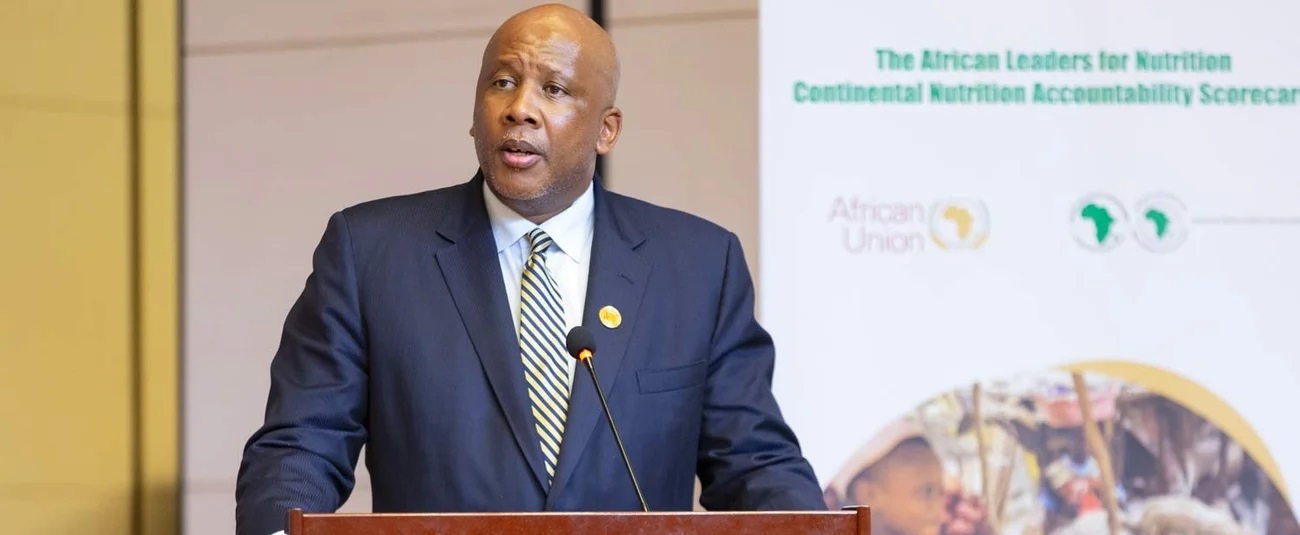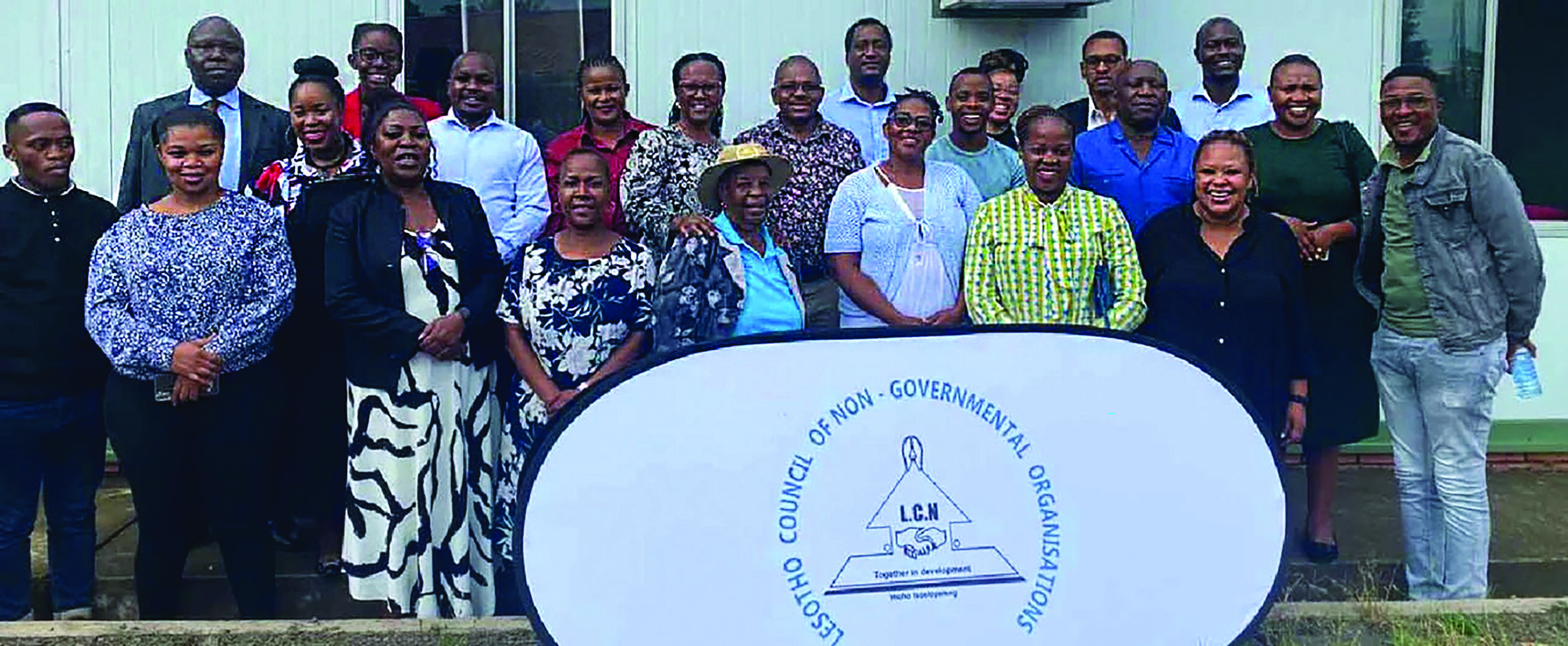Ntsoaki Motaung
It is now the time for the multilateral and bilateral development partners, technical agencies of the United Nations (UN), civil society, and non-state actors to work together to support investments in multi-sectorial nutrition programmes.
This was said by the African Leaders for Nutrition Coordinator, Gorge Ouma of the African Development Bank (AfDB), this week during the opening of the High-Level Dialogue on Nutrition Financing held at ‘Manthabiseng Convention Center in Maseru.
The high-level dialogue started yesterday and ends today.
Ouma affirmed the commitment of the AfDB saying the bank would be working with all partners to share its experience in implementing banking on nutrition programme – a multi-sectorial nutrition action plan that has seen a significant increase in nutrition investments supported by the bank across the continent.
“Today over 250 million people will go hungry. A study conducted by the African Union three years ago revealed that 56 million children under the age of five will chronically under-nourish with 13 million at the risk of starvation,†he said.
He indicated that a more recent study showed that almost 61 million children in Africa suffer from stunting.
“The Africa Leaders for Nutrition hosted by the African Development Bank proposes three major outcomes to ensure that the Africa Union year of nutrition meets its expectations,†he said.
“The first one is securing financial investments to a comprehensive multi-sectorial nutrition action plan, the second is identifying cost-effective interventions that can be delivered quickly and be scaled up and lastly, to encourage African leaders to demonstrate accountability as they fight hunger in line with the united nations sustainable development and the targets set by the world health Assembly,†he added.
The representative of the United Nations (UN), Dr Georges Alfred KI-ZERBO, said climate change and human insecurity increased displacements and food insecurity.
“These multiple shots threaten the gains made towards the UN SDGs and the Africa union agenda 2063 the Africa we want,†Ki-Zerbo said.
He added: “Recent estimates indicate that hunger affects 278 million people worldwide and that foodborne diseases cause 91 million illnesses and 137 thousand deaths annually.â€
Today, according to Ki-Zerbo, the world faces a double burden of malnutrition including under-nutrition as well as overweight and obesity.
He indicated that the trend was concerning especially in low and middle-income countries.
“To the developmental economic, social, mental and medical impacts of the global burden of malnutrition affects individual families, communities and nations,†he said.
According to the 2022 Global Nutrition Report, in the African region, there has been modest progress towards achieving global nutrition targets.
The global target for overweight in children under five years of age has 28 countries on course to meet it.
Exclusive breastfeeding among infants aged 0 to 5 months has 20 countries on course, wasting among children under five years of age has 19 countries on course, while stunting among children under 5 years of age has six countries on course.
“However, not a single country in the region is on course to meet the targets for anaemia in women of reproductive age (aged 15 to 49 years), low birth weight, diabetes among men, diabetes among women, obesity among men, and obesity among women,†read the report.
Meanwhile, Lesotho is on course to meet two of the global nutrition targets for which there was sufficient data to assess progress.
The country is also on course to meet two targets for maternal, infant and young child nutrition (MIYCN).
The global nutrition report shows that no progress has been made towards achieving the target of reducing anaemia among women of reproductive age, with 27.9 percent of women aged 15 to 49 years now affected.
“Meanwhile, there has also been no progress towards achieving the low birth weight target, with 14.6 percent of infants having a low weight at birth. Some progress has been made towards achieving the exclusive breastfeeding target, with 59.0 percent of infants aged 0 to 5 months exclusively breastfed,†the report read.
It added: “Similarly, Lesotho has made some progress towards achieving the target for stunting, but 34.6 percent of children less than 5 years of age are still affected, which is higher than the average for the African region 30.7 percent.
“Lesotho is on course for the target for wasting, with 2.1 percent of children under 5 years of age affected, which is lower than the average for the Africa region’s 6.0 percent. The prevalence of overweight children under 5 years of age is 6.6 percent and Lesotho is on course to prevent the figure from increasing.â€
The report further indicated that Lesotho had shown limited progress towards achieving the diet-related non-communicable disease (NCD) targets.
It read: “30.1 of adults aged 18 years and over women and 5.9 percent of adult men are living with obesity. Lesotho’s obesity prevalence is higher than the regional average of 20.8 percent for women but is lower than the regional average of 9.2 percent for men. At the same time, diabetes is estimated to affect 11.2 percent of adult women and 9.1 percent of adult men.â€
Speaking at the Dialogue, prime minister Samuel Matekane also emphasised the need for governments, legislatures, and the private sector to join hands in combatting the effects of malnutrition across the African continent.
“Let us also remember that coordination, collaboration and multi-sectoral approach are key in achieving better results for all Africans,†Matekane said.
He said nutrition was core to the health, well-being, and economic development of the continent.
Matekane stated that nutrition can no longer be looked at as an issue of food production, yet it involves every sector within the cycle of food systems, that is, from farm to fork.
“This cycle of the food system highlights the importance of all stakeholders and partners on both their contribution and benefits. We can all attest to the fact that the loss of time and income due to ill health, mental and physical under-development and non-communicable diseases affects the private sector just as it does the economic development of individuals, families, countries and the continent at large,†he said.
Lesotho’s Ambassador to the Democratic Republic of Ethiopia and Permanent Representative to the African Union (AU) and United Nations Economic Commission for Africa (UNECA), Professor Mafa Sejanamane, said the dialogue is expected to produce a Plan of Action on the Abidjan Declaration for Nutrition as well as the operationalisation of financing.
“Another key expected outcome is the Member States’ commitment to nutrition and support for country-level financial investment and national legislative and policy instruments aimed at accelerating progress on food security as well as nutrition challenges,†Sejanamane said.
The high-powered session is set to review initiatives on private sector engagements and unpack the role of the private sector and plans in innovative financing for nutrition on the continent.
It will also assess accountability in resource allocation as well as Parliamentarians’ oversight of budget allocation.

Your Trusted Source for News and Insights in Lesotho!
At Newsday Media, we are passionate about delivering accurate, timely, and engaging news and multimedia content to our diverse audience. Founded with the vision of revolutionizing the media landscape in Lesotho, we have grown into a leading hybrid media company that blends traditional journalism with innovative digital platforms.









